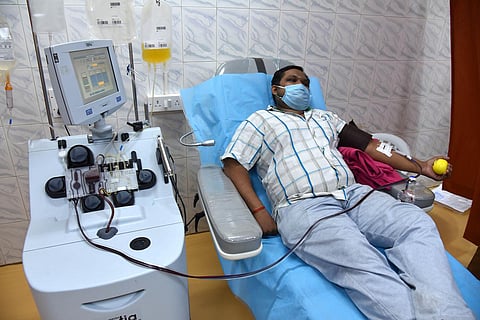

NEW DELHI: Convalescent plasma seems to be inducing an almost magical effect in some COVID-19 patients but does not give much benefit to others. The answer to the tricky question of which category of patients medically qualify to benefit from this therapy could be a few weeks away.
A group of researchers attached with ID&BG hospital and the Centre for Scientific Research-Indian Institute for Chemical Biology in Kolkata have undertaken a comprehensive randomised control trial (RCT) to assess the efficacy of plasma therapy and its immunological aspects in COVID-19 patients.
An interim analysis based on 20 moderate to severe patients—10 of whom received plasma therapy while the other half received standard care—prepared by these researchers and submitted to the state government a few days back says that the therapy looked “promising.”
“Early results are promising and I hope that it continues as the trial with a total of 80 patients progresses,” immunologist Dr Dipyaman Ganguly who is the principal investigator in the trial told The New Indian Express.
“Importantly, we are not only looking at clinical outcomes but also for immune system changes in the plasma recipients - to generate data on how and why plasma is or is not making a difference in COVID-19 patients,” he said.
Dr Ganguly said that the trial is likely to be completed by September end.
The findings of the crucial trial could have major policy implications and will help firm up the scientific basis on which doctors could decide which patients qualify to benefit from the treatment.
Convalescent plasma therapy involves transfusing antibodies from the blood of people who have recovered from COVID 19 -- at least 14 days after their complete recovery -- into people who are very ill with the infection or even people who are at high risk of contracting the virus.
So far there is no clear evidence to prove that it works but trials at several sites across the world, including in India, have suggested that it could help some COVID-19 patients in advanced stages of illnesses.
In the country, the Union health ministry and the Indian Council of Medical Research, which is also leading a multi-centre RCT on the therapy whose results are awaited, have indicated that the treatment is only for investigational purposes but the therapy is rampant in hospitals across states.
A meta-analysis of RCTs on plasma therapy in the US made public a few days back showed that hospitalized COVID-19 patients who received transfusions of blood plasma rich with antibodies from recovered patients had their mortality rate reduced by about 50%.
An interim analysis by doctors at AIIMS, Delhi, undertaking the RCT, however, reportedly did not find any mortality benefit in patients who received the treatment. Early analysis from some other centres in the country, on the other hand, have thrown results to the contrary—further strengthening medical views that patients with certain biological markers are more likely to benefit from this treatment.